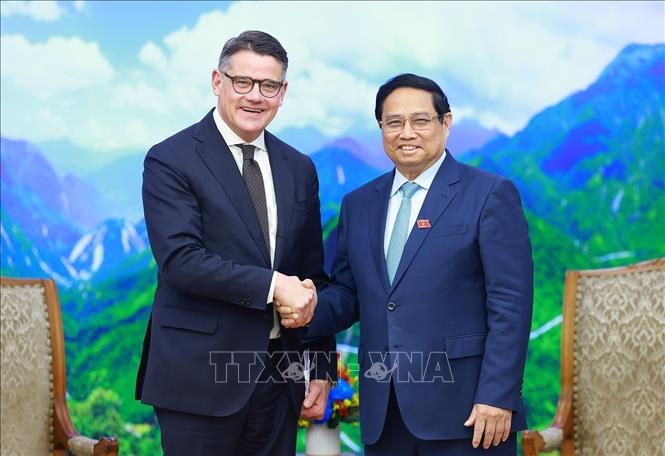PM encourages German investments in Vietnam
VOV.VN - Prime Minister Pham Minh Chinh encouraged businesses from Germany, including the state of Hesse, to increase their investments in Vietnam for mutually beneficial cooperation, during his reception in Hanoi on November 28 for Hasse Minister-President Boris Rhein.

Chinh welcomed Rhein’s visit to Vietnam, saying it took place at a time when the Vietnam-Germany Strategic Partnership, in general, and the Vietnam-Hesse relationship, in particular, are developing positively across all areas.
He emphasized that Vietnam is focused on implementing three strategic breakthroughs, namely perfecting the institutional framework, developing human resources, and building infrastructure, with a strong emphasis on sustainable development, digital transformation, and green transformation.
In this context, he said Vietnam values the development of its Strategic Partnership with Germany in general, and prioritizes cooperation with the state of Hesse in particular, which has many strengths in areas such as the economy, finance, science and technology, and industry.
Chinh noted with satisfaction the relationship between Vietnam and Hesse has developed very positively and effectively over the years, with two-way trade turnover reaching around EUR1 billion, accounting for about one-tenth of the total trade turnover between Vietnam and Germany. Many Hesse-based companies, such as Bilfinger & Berger, Messer, Sanofi-Aventis, Fresenius, and Commerzbank, are making effective investments in Vietnam.
The PM requested that Hesse use its influence to urge the German Bundestag to quickly ratify the Vietnam-EU Investment Protection Agreement (EVIPA), and continue to encourage Hesse’s businesses to invest and operate in Vietnam. He also requested continued support for the development and expansion of the Vietnam-Germany University, particularly in fields such as high technology, finance and banking, semiconductor industry, and artificial intelligence.
He asked Hesse and Germany to share their experiences in implementing sustainable development projects, addressing climate change, and promoting clean and renewable energy to achieve carbon emissions reduction goals. He expected that the German side would support Vietnam in accessing funding, management experience, and human resource training to implement the Just Energy Transition Partnership (JETP).
The PM encouraged Germany and Hesse to continue to receive Vietnamese workers, especially skilled labour, and create favourable conditions for Vietnamese expatriates to live, work, and integrate locally.
Agreeing with the PM’s comments and proposals, Rhein affirmed that Hesse would continue to support the development and expansion of the Vietnam-Germany University, a flagship project undertaken by Hesse, encourage stronger connections between educational and research institutions of both sides in fields such as high technology, finance and banking, semiconductor industry, and artificial intelligence, and maintain the scholarship program for Vietnamese students and researchers.
Emphasizing that Hessen is in need of skilled workers from Vietnam, Rhein suggested that both sides take advantage of the favourable conditions created by Germany's recent approval of the Skilled Immigration Act to expand the supply of labour from Vietnam to Hesse, helping to generate opportunities for Vietnamese workers to come to Germany and address the labour shortages in the state.
The Minister-President of Hesse highly appreciated the positive contributions of Vietnamese expatriates to the state’s prosperity and cultural diversity, and affirmed that the state government would continue to create favourable conditions for the expatriates to live and work, preserve their cultural identity, and play an important role as a bridge of friendship between Vietnam and Hesse.




